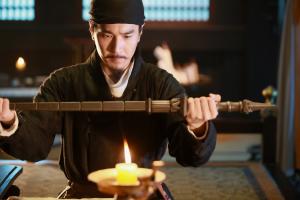By Christian Hamaker
In case you hadn’t noticed, the market for international cinema in the United States is changing. The avant-garde and breakthrough foreign-language films of the 1950s and ’60s long ago were joined by occasional foreign-language films that broke out of the Best Foreign Language Oscar ghetto to broader awards acclaim and mainstream acceptance—think Life Is Beautiful or The Postman.

For the last several years, the box-office charts have been populated with an increasing number of genre films from India, Korea and other countries. These releases are booked at multiplexes that are now finding a demand among increasingly diverse audiences for lavish productions from other countries starring names unfamiliar to most U.S. moviegoers.
One recent success has been the Detective Dee films from China. Directed by Tsui Hark, who produced some of director John Woo’s best-known works (The Killer, A Better Tomorrow), the first two Detective Dee films—Detective Dee and the Mystery of the Phantom Flame and Young Detective Dee: Rise of the Sea Dragon—feature fantastical storylines, eye-popping special effects and vigorous action sequences. Having watched both films with two sons, at the time ages 10 and under, I can testify that those films played powerfully for the younger set (Phantom Flame is rated PG-13, while Sea Dragon is unrated) and entertained their 40-something father with skillful action set pieces and vibrant visuals.
The latest entry, Detective Dee: The Four Heavenly Kings, comes across as stale by comparison, even as it ups the supernatural ante with its Buddhist tale of gods, sorcery, mystical clans and dragons. It’s not that the film’s religious ideas are challenging so much as that the story is convoluted and the characters too many, too early. Don’t be surprised if you find yourself overwhelmed and tuning out just as the narrative is trying to heat up.
Four Heavenly Kings finds the empress (Carina Lau) coveting the dragon mace, a powerful weapon given to Dee, head of the Bureau of Investigations, at the end of Sea Dragon. In defense, Dee goes up against a group of supernatural foes whose members have power over fire, water and nasty bladed instruments in ways that put Dee at a distinct disadvantage.
These “heavenly kings” are more like stock villains than philosophical, religious figures; the closest the film comes to meaningful religious dialogue is in a repeated maxim, “Hell is full of suffering fools, so enlightenment must wait.” But even that, like the chanting of sutras late in the film, is a plotting means to an end rather than anything deeply meaningful. The film’s overpopulated cast also includes the “wind warriors”—a group determined to take down the Tang Dynasty—a fire-breathing dragon and a giant ape.
The abundant CGI is effective at times, but it’s also mostly exhausting. There’s just too much of everything thrown into Four Heavenly Kings, and while it might appeal to the younger set, the film’s cluttered early stretch is convoluted to the point where attentive viewers may throw in the towel before the story has a chance to build. By its end, Four Heavenly Kings doesn’t leave us wanting another chapter in the Detective Dee series so much as it leaves us glad we made it to the credits of this installment.
Like modern Hollywood blockbusters, Four Heavenly Kings mistakes busy-ness for complexity and, in this case, religious terminology for meaningfulness. Its only mystery is how it ended up being overwhelming in all the wrong ways.









